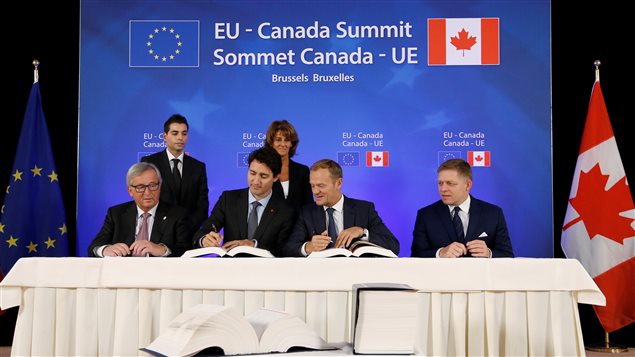Canada’s free trade agreement with the European Union designed to diversify its trade away from its overwhelming dependence on the United States will produce “modest” economic gains for the country’s economy, according to the latest report by the Parliamentary Budget Officer (PBO).
The federal budget watchdog estimates the Comprehensive Economic and Trade Agreement (CETA) would have lifted Canada’s overall economic output by 0.4 per cent or $7.9 billion, if it had been implemented in 2015.
The report says Canadian exports of goods to the EU would have increased $4 billion, services would have been up $2.2 billion and investment would have grown by $3.1 billion.
The report forecasts larger long-term gains as the Canadian economy continues to grow.
Diversifying trade
However, the budget office predicts some Canadian sectors will likely see slower growth under the agreement – including some dairy and agricultural products, textiles and some machinery and manufactured goods.
On the other hand, sectors including transport and motor vehicles, some metals and wheat will likely show faster growth.
The report also says strengthening business ties with the EU will make Canadians a little less dependent on their existing trade partners.
In 2016, Canada exported some $39.8 billion worth of goods to the EU, making it Canada’s second most important export destination, according to the PBO report. But this is still only a tenth of the exports that go to the United States, the report said. Canada’s sales of oil and gas to the U.S. alone are worth more than all the goods and services it sells to the EU.
The report forecasts that once CETA is implemented more of Canadian trade will be diverted from its traditional trade partners towards the EU countries. Canada’s annual exports to the U.S. could decline by 0.4 per cent or $1.4 billion, while exports to the rest of the world may fall by 0.7 per cent or about $384 million, the report said.
‘Fairy tale world’ assumptions

“The Parliamentary Budget Officer is alerting us to the fact that CETA won’t create 80,000 new jobs and put thousands of dollars in our pockets, as was previously claimed by the Harper government,” said Maude Barlow, National Chairperson of the Council of Canadians, a citizens’ advocacy group that campaigned against the free trade deal. “In exchange for a pitiful amount of economic growth, we will increase lawsuits from European companies, destroy our family farms, decimate our fisheries, and raise our drug prices. It just doesn’t make sense.”
Sujata Dey, Trade Campaigner for the Council of Canadians, said they disagreed with many of the assumptions in the report.
“Most glaringly, it uses the CGE model, the Computer Generalized Equilibrium model which lives in the fairy tale world of full employment,” Dey said. “The study also looks at what we export, but not at the damage of what happens from imports. Also, the model doesn’t look at what it does to public services, and to workers.”
Despite the government’s claims of massive economic benefits, the report predicts very small gains in GDP, Dey said.
“This is another model which completely ignores them and assumes that trade will always be good, under any circumstances,” she added.
The report also concludes that overall the EU will gain more from CETA than Canada because Canada’s exporters were facing lower tariffs in Europe than what Canada was levying from EU exports prior to the agreement.
With files from The Canadian Press







For reasons beyond our control, and for an undetermined period of time, our comment section is now closed. However, our social networks remain open to your contributions.